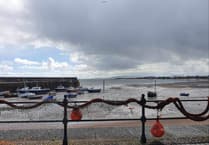LOSSES suffered by West Somerset’s most-loved visitor attraction ran at more than £8,000 a week in its last financial year, accounts filed with Companies House have disclosed.
The West Somerset Railway (WSR) suffered an after tax hit of £422,690 in the trading year to March 31, 2024, 51 per cent more than its 2023 loss of £216,317.
The losses came despite a near-£365,000 income rise during the year to £3,090,962.
WSR chairman Jonathan Jones-Pratt said more than half of the loss was ‘necessary adjustments’ from the release of a long-term hire contract with the Somerset and Dorset Railway Trust for locomotive 53808.
Mr Jones-Pratt said the WSR had paid £240,249 to buy out of its obligation to contribute to the locomotive’s restoration.
However, the year’s accounts did not show a £210,000 exceptional item for recognition of the overhaul cost agreed post-year end for locomotive 53808, which would be paid in monthly instalments over the next five years.
Mr Jones-Pratt said the losses had reduced the railway’s cash reserves this year by £77,413, but there were still adequate reserves to continue trading for at least 12 months.
But he said the WSR remained in need of regular and significant capital investment.
He said: “In recent years, this investment has been financed from cash reserves as the level of profit generated has not been sufficient.
“In the future, the company will need to generate more profit or identify other ways to finance this continued investment in the railway.”
Mr Jones-Pratt said he was confident the WSR would return to profitable trading in the future.
He said the railway had started the year with the aim of minimising losses, but trading performance exceeded expectations with growth achieved in both fare income of 9.4 per cent and 22.2 per cent in retail.
Mr Jones-Pratt said: “Given that fare income has historically seen a steady decline, the increase this year is encouraging.
“Final results were ahead of budget with a small operating profit, before depreciation and impairments.”
Mr Jones-Pratt said enormous changes had taken place since the first passenger train ran in 1976 on the heritage railway, the longest in the country.
He said: “We will certainly have something very significant to celebrate in two years’ time.
“But I suggest we can have some, perhaps more muted, celebration that in 2024 we are in a strong position to continue our progress to our half-century.”
WSR independent auditor Alexandra Shore pointed to the railway showing an operating loss in two consecutive years and a current negative profit and loss reserves balance and faced ‘continued uncertainty regarding its ability to generate sufficient cash to cover operational and capital expenditure’.
Mrs Shore said: “These events or conditions, along with other matters, indicate a material uncertainty exists that may cast significant doubt on the company’s ability to continue as a going concern.”
The WSR refused to comment on the accounts for the Free Press this week.




